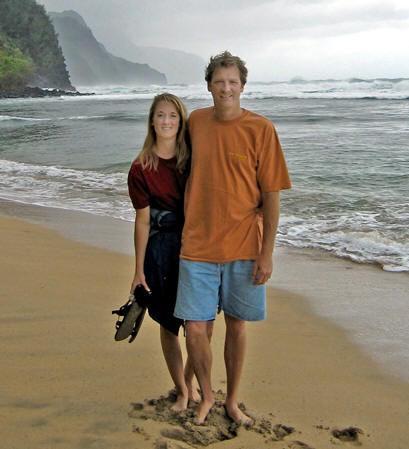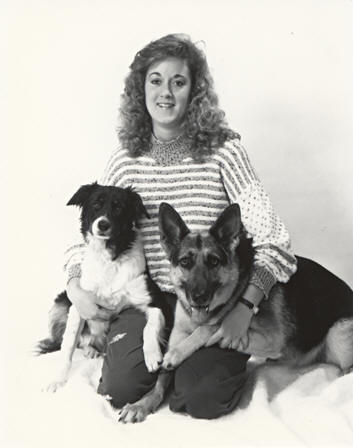|
In 1991 Billy and Akaisha Kaderli retired at the age
of 38. Now, into their 4th decade of this
financially independent lifestyle, they invite you
to take advantage of their wisdom and experience. |
|
|
Millionaire Mommy Next Door
Billy and Akaisha Kaderli
Known to the blog world and
on national television as The Millionaire Mommy Next Door, Jen
Smith went from working a minimum wage job as a college drop-out to financial
freedom as a debt-free, self-made millionaire by age 40. Since Jen didn't
inherit wealth or win the lottery, she serves as the kind of example we admire.
She has graciously given us time for an interview. Read and benefit from her
wisdom below!
You and your husband became
financially independent at the age of 40. What was your biggest motivator to
achieve this lifestyle?
Initially, FEAR motivated me to achieve financial freedom. I didn't want to
repeat my parent's experiences. Money was a constant source of tension and
stress when I was growing up. My parents were intelligent, capable and
hard-working, yet they lived paycheck to paycheck. My father had always been,
and continues to be, a workaholic. My siblings and I always wished that he would
work less and spend more time with us. After they divorced, I watched my mom
struggle to raise me and my two siblings. We often survived on free lunch
tickets and food stamps. I watched my mother approach retirement age with much
anxiety over the fact that she hadn't saved for her golden years. In the end,
after her successful bone marrow transplant -- and despite the fact that my
husband and I promised to provide financially for her -- she starved herself to
death because she was terrified of living the rest of her life financially
dependant on others.

Jen and her husband on
the island of Kauai When I was 30, I told my husband, “I don't want to repeat my parents'
experiences. I want to be financially-free before we adopt our child. I want to
have enough money that we can afford to put our family first – to work only when
we want to”. I read books, played around with retirement planning software, and
learned to be frugal and downsize our lifestyle. I learned how to make money
work for me instead of the other way around.10 years later, at age 40, we were
100% debt-free and we had accrued over a million dollars. We then adopted our
daughter. Melia now has two parents that have the financial resources and the
free time to put family first.
How long has your website, Millionaire Mommy Next Door, been in existence?
The original website, began
in July 2007. Unfortunately, the site was hacked into in October 2008 so I'm in the process of starting anew on my self-hosted domain
at millionairemommynextdoor.com.
You seem to be very generous in sharing your practical financial wisdom with
your readers. I love your comments: "I learned to make money, save money, invest
money and spend money in in ways that I find rewarding and fun. No one else
cares as much as I do about my money. "
Can you explain simply what your investing style is?
Thank you. I've experimented with several investing styles using a diverse
portfolio of stocks, mutual funds and ETFs. The strategy I've had the most
success with employs the use of momentum investing. I currently use the
quantitative approach offered by NoLoad FundX. I use their Upgrader mathematical
model to move my holdings incrementally to the new market leaders as they
emerge.

The whole family on a
recent trip to New York City
Conventional wisdom suggests that because you can’t predict leadership changes,
you have to ride through market swings with a diversified portfolio -- including
holdings that underperform for a long period of time with the hope that they
will add value later. Instead, I hold the positions that do well and upgrade the
others. I use the Upgrader scores to tell me when to enter and exit each
position. I don't aim to forecast the market -- I look at what the market is
doing, not what the market might do. I enter the market after a trend properly
establishes itself, then jump on the trend and ride with it. If there is a
persistent turn contrary to the trend, I follow the mathematical signal, exit
that trend, and upgrade. This might sound tricky and time consuming, but
actually, it takes me only an hour or two, once per month.
I've also kept a smaller percentage of our total portfolio using the more
popular, long-term passive strategy of buy-and-hold index investing.
Does a market such as the one we have been experiencing change your investment
plan?
When even the highest Upgrading scores came in as negative numbers, I personally
chose to exit the market. Why? Because this indicated a downward trend in the
market. Consequently, since early 2008, I've held a lot more cash in our
portfolio than I ever have before.

Family at the New York
Stock Exchange How do you spend your money in ways that are rewarding and fun?
We choose to live
the good life, not the goods life. We identify our personal and family
values and
spend accordingly.
For instance, we value our health and our planet, so we spend more to purchase
organic foods. We value recreational pursuits, so we budget generously for fun
family activities, hobbies and personal interests. We love to travel, so we
allot a hefty percentage of our annual budget to worldly adventures.
We balance this generous spending by cutting back or eliminating the budget
categories that are personally less rewarding. For instance, we buy our clothes
at consignment stores, drive a 10 year old car, and live in a “just the right
size” home.
In other words, we are do-ers, not hav-ers.
Share with us your best money-saving secret.
In many cases, it makes financial sense to rent your home rather than buy it.
But regardless of whether you decide to rent or buy, avoid the temptation to
live in a too-big house. You can save big money by reducing your total housing
expense – rent/mortgage, insurance, tax, maintenance, repairs, utilities,
furnishings – these can add up to big money! Don't aim to keep up with the
Joneses – aim to be like Goldilocks and live in a home that is just right.
What is your greatest extravagance?
I enjoy a standing weekly appointment with my massage therapist.
How do you figure the dollar amount to spend each year?
We review and modify our lifetime financial plan (with a tool found in Microsoft
Money software) each year. This tool enables us to see if (and how) our money
can last throughout our lifetime. We then tweak our budget to match the total
annual living expenses that the tool indicates we should be able to safely
spend. The Lifetime Planner allows us to play around with lots of “what-if”
scenarios, both today and in the future.
Do you own a house or rent? Why?
We sold our last house about 5 years ago and have been renting ever since. Why?
Because we could see the handwriting on the wall as home prices rose to
irrational and unsustainable heights. People thought we were crazy at the time
for “throwing our money away” as renters. Now that the housing bubble is clearly
burst, I fight the urge to tell them, “I told you so!”. We invest the difference
between the mortgage payments (plus insurance, repairs, taxes, etc) we had been
paying as a homeowner and the rent we now pay. Selling our home, downsizing, and
renting has contributed significantly to our growing net worth.
As home prices plummet in today's market, we're watching the price-to-rent
ratios. When this number drops once again to long-term historical norms, we'll
consider buying again.

Jen in her early years as
a dog trainer From your website, I understand that your most difficult challenge to financial
independence were unexpected events. How did you manage them, and still maintain
your goals?
Plan for the best, prepare
for the worst, keep your focus on what matters most and go with the
flow. And through it all, CHOOSE to be happy, no matter the
circumstances. Research has found that
happy people make more money.
From your experience in receiving countless letters from your readers, what is
the greatest hurdle preventing others from achieving their own financial
independence?
Mindset. Achieving wealth is often more about a mindset than it is about math.
For instance, I can remind people that they need to live below their means until
I'm blue in the face. But if they don't have their mind and heart wrapped around
their goal, they won't do what it takes.
People often tell me that they feel stuck.
I hope to inspire, educate and empower others to identify their dreams and learn
how to reach them. I hope to serve as someone who reminds people that anything
is possible when you seek solutions.
I create
treasure maps
that help me visualize the life I want to lead. I paste magazine pictures and
words onto a poster board, then hang it over my computer and update it as
necessary. The more familiar and comfortable you feel with your dreams and
goals, the more your thoughts direct your actions. When your actions change,
your life circumstances change.
How do you plan to pay for your child’s higher education?
We are educating and empowering our daughter to figure this out WITH us. She is
being raised by two entrepreneurial role models who are eager to coach and
mentor her to discover her own path to financial freedom. Besides, neither my
husband nor I finished college, so we'd be hard pressed to tell her that she
needs to get a degree in order to succeed.

Learning how money works
begins early! How do you teach your child fiscal responsibility? How do you help your child
handle peer pressure in her world?
Modeling healthy personal finance behaviors is the key to raising money-savvy
children. Our daughter is only three, but already she's learning how money
works. She loves shopping at the Dollar Store for stickers, coloring books and
toys. She knows that she needs to earn a dollar before she can go shopping, so
she'll offer to dust the living room or take some of her old toys to the local
consignment store to sell first.
We talk openly about money with her and always will. Children learn from our
example. If we behave as though money management is painful, secretive, or
confusing, we thwart our children's financial future. Is this what we want for
our children? Of course not. We all want our children to acquire the tools
necessary to power their own future financial independence and
freedom. Unfortunately, few high school students graduate with any
formal personal finance instruction. Children receive the majority of
their financial literacy from their parents.
What do you do about health insurance?
We keep our small plumbing business around so we can qualify for a group policy.
This eliminates the pre-existing conditions clause. We have an HSA account with
a high annual deductible to reduce monthly premiums.
What would you say your biggest challenge has been in maintaining your
retirement goals while raising a family?
Some of our living expenses have gone up, but we've managed to cut back on other
budget categories to compensate. The biggest bump up for us has been preschool
tuition and the additional plane ticket when we travel. Now that she's over two
years of age, she requires a full-fare seat.
There are plenty of ways to raise a child well AND frugally. For instance, we
buy her clothes and toys at a consignment shop and share restaurant meals with
her (they're usually over-sized, anyway).
What is the #1 tip you could give other parents who want to retire early?
Involve the entire family in the planning and process. When the entire family is
on board, keeping to a budget becomes easy. The family shares a creative,
problem-solving energy and everyone feels empowered. Kids often think “outside
of the box” better than adults do. They will surprise you with their remarkable
insights and ideas.
One other thing: I don't think parents should work overtime (over 40 hours a
week) to reach their early retirement goal. Kids grow up so fast and they really
need their parents around, today and everyday. My dad was a workaholic so we
rarely spent time with him. That stunk.
Who are your heroes in real life?
People who have a dream, follow their passion, and share their talents with
others. Everyone who volunteers or supports a humanitarian cause. We all hold
the ability to make a positive difference in the lives of others within our
worldwide community. We can all be “everyday heroes”!
In one sentence, what is your philosophy on life, or your motto?
Happiness is a choice -- if you don't like the story your life has become, tell
yourself a better one!
We would like to thank Jen
for her generosity in answering our questions and if you would like to learn more
visit her at millionairemommynextdoor.com.
To read more
interviews with Expats, Early Retirees and Interesting Characters,
click here

About the Authors
Billy and Akaisha Kaderli are
recognized retirement experts and internationally published authors on
topics of finance, medical tourism and world travel. With the wealth of
information they share on their award winning website RetireEarlyLifestyle.com,
they have been helping people achieve their own retirement dreams since
1991. They wrote the popular books, The
Adventurer’s Guide to Early Retirement and Your
Retirement Dream IS Possible available on their website
bookstore or
on Amazon.com.
Trending on Retire Early
Lifestyle



Retire
Early Lifestyle appeals to a different
kind of person – the person who prizes their
independence, values their time, and who doesn’t
want to mindlessly follow the crowd.
|